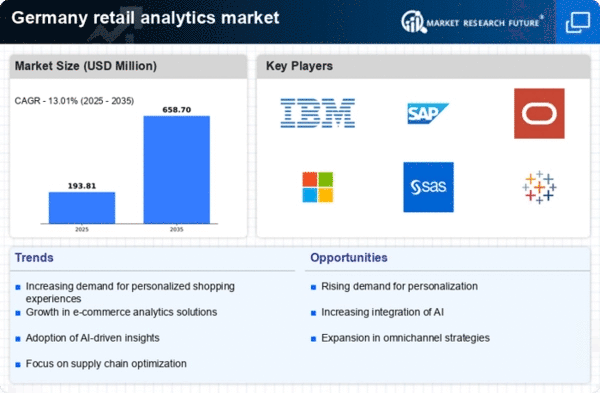Growing Importance of Personalization
The growing importance of personalization in retail is a key driver for the retail analytics market. German consumers are increasingly expecting tailored shopping experiences, which has prompted retailers to adopt analytics solutions that facilitate personalized marketing. Reports indicate that personalized marketing can lead to a 20% increase in conversion rates. By analyzing customer data, retailers can segment their audience and deliver targeted promotions, enhancing customer engagement and loyalty. This trend is likely to continue as retailers strive to differentiate themselves in a crowded market. The emphasis on personalization not only improves customer satisfaction but also drives revenue growth, thereby reinforcing the demand for advanced analytics in the retail sector.
Integration of Advanced Data Analytics
Advanced data analytics tools are pivotal drivers in the retail analytics market. Retailers in Germany are increasingly leveraging sophisticated analytics to gain insights into consumer behavior and preferences. This trend is evidenced by a reported growth of 15% in the adoption of analytics solutions among retailers in the past year. By utilizing predictive analytics, businesses can forecast demand more accurately, optimize inventory levels, and enhance supply chain efficiency. The ability to analyze large datasets allows retailers to tailor their offerings and improve customer satisfaction and loyalty. As the retail landscape becomes more competitive, the reliance on data-driven decision-making is likely to intensify, further propelling the retail analytics market forward.
Regulatory Compliance and Data Security
Regulatory compliance and data security are becoming increasingly critical in the retail analytics market. In Germany, stringent data protection regulations, such as the General Data Protection Regulation (GDPR), require retailers to implement robust data management practices. This has led to a heightened focus on analytics solutions that ensure compliance while providing valuable insights. Retailers are investing in technologies that enhance data security and privacy, which is essential for maintaining customer trust. The need for compliance is likely to drive the adoption of analytics tools that not only analyze data but also safeguard it. As regulations evolve, the retail analytics market will continue to adapt, ensuring that retailers can operate within legal frameworks while leveraging data effectively.
Rise of E-commerce and Omnichannel Strategies
The rise of e-commerce and the implementation of omnichannel strategies are significantly influencing the retail analytics market. In Germany, e-commerce sales have surged, accounting for approximately 20% of total retail sales in 2025. This shift necessitates the use of analytics to understand customer interactions across various channels. Retailers are increasingly investing in analytics to track customer journeys, optimize marketing efforts, and enhance the overall shopping experience. The ability to analyze data from both online and offline channels enables retailers to create cohesive strategies that drive sales and improve customer engagement. As e-commerce continues to expand, the demand for robust analytics solutions is expected to grow, thereby benefiting the retail analytics market.
Technological Advancements in Retail Analytics
Technological advancements are a significant driver of growth in the retail analytics market. Innovations such as cloud computing, big data technologies, and real-time analytics are transforming how retailers operate in Germany. The adoption of cloud-based analytics solutions has increased by 30% in the past year, allowing retailers to access and analyze data more efficiently. These technologies enable businesses to process vast amounts of data quickly, providing insights that can be acted upon in real-time. As retailers seek to enhance operational efficiency and customer experience, the integration of cutting-edge technologies into analytics practices is likely to become more prevalent. This trend not only supports better decision-making but also positions retailers to respond swiftly to market changes.
















